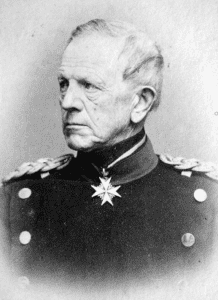
Helmuth Karl Bernhard Graf von Moltke was a German Field Marshal, the chief of staff of the Prussian Army for thirty years. He was instrumental in developing a system for the Prussian military in the 1800s that could deal with the uncertainty of the battlefield and is regarded as the creator of a new, more modern method of directing armies in the field.
Moltke’s famous observation that ‘no plan of operations extends with certainty beyond the first encounter with the enemy’s main strength’ is more usually represented as,
“no plan survives contact with the enemy”
and is a reminder to every project manager that plans need to take note of changing circumstances.
Moltke’s view was that military strategy had to be understood as a system of options since it was only possible to plan the beginning of a military operation. The main task of a leader was to make extensive preparation of all the possible outcomes which led him to state that,
“Strategy is a system of expedients”
Prussian military strategy in the mid-19th century was surprisingly modern in outlook. Stephen Bungay in his book, The Art of Action, describes it thus:
‘Mission command is built on three important principles that guide the way leaders direct their people.
- Do not command more than necessary or plan beyond foreseeable circumstances.
- Communicate to every unit as much of the higher intent as is necessary to achieve the purpose.
- Ensure that everyone retains freedom of decision within bounds.’
Modern project management encapsulates these principles in rolling wave planning, empowerment, product variation and project tolerances.
Moltke has another claim to fame having recorded some excerpts from Shakespeare and Goethe on two cylinders on Edison’s newly invented cylinder phonograph in 1889. These are the only known voice recordings from someone born as early as 1800.
To show how relevant Moltke’s famous quotation is in the modern world, we only need to turn to heavyweight boxer Mike Tyson’s streetwise observation,
“Everyone has a plan ‘till they get punched in the mouth”